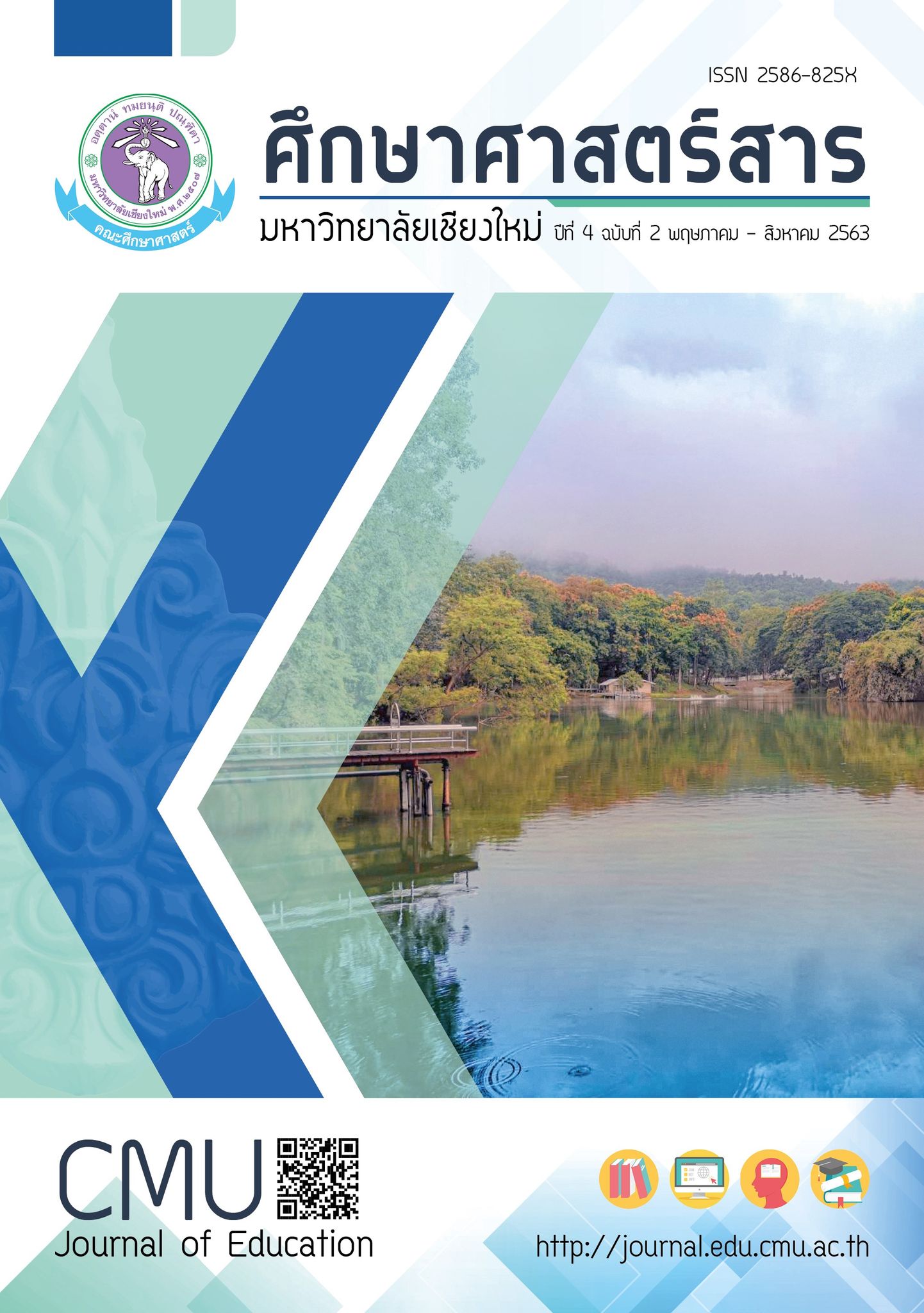The Results of the engagement in English learning activities through vocabulary games of matthayom 1 students at Rittiyawannalai School
Main Article Content
Abstract
The objectives of this research were 1) to study Matthayom 1 students’ engagement in English learning activities through vocabulary games 2) to study the effectiveness of the students’ English vocabulary knowledge after using games. The population was 671 Matthayom 1 students from Rittiyawannalai School. The sample was 45 students from Matthayom 1/14 section who studied English E21102 in the second semester of the 2019 academic year. They were selected by cluster random sampling. The research instruments included 1. self-assessment form of students’engagement 2. six vocabulary game-based lesson plans and 3. English vocabulary test. The data was analyzed by using percentage (%), mean ( ) and standard deviation (S.D.). It found that 1) Matthayom 1/14 students had high engagement behaviors in English learning. The students’ engagement behaviors in the classroom were 77.90% 2) Matthayom 1/14 students had quite good level of English vocabulary achievement with 66.31 per cent of the total students’ scores.
Article Details

This work is licensed under a Creative Commons Attribution-NonCommercial-NoDerivatives 4.0 International License.
หากผู้เสนอบทความมีความจำเป็นเร่งด่วนในการตีพิมพ์โปรดส่งลงตีพิมพ์ในวารสารฉบับอื่นแทน โดยกองบรรณาธิการจะไม่รับบทความหากผู้เสนอบทความไม่ปฏิบัติตามเงื่อนไขและขั้นตอนที่กำหนดอย่างเคร่งครัด ข้อมูลของเนื้อหาในบทความถือเป็นลิขสิทธิ์ของ Journal of Inclusive and Innovative Education คณะศึกษาศาสตร์ มหาวิทยาลัยเชียงใหม่
References
นริสา กัลยา. (2552). การพัฒนากิจกรรมการเรียนการสอนคำศัพท์ภาษาอังกฤษของนักเรียนชั้นประถมศึกษาปีที่ 3 โดยใช้เกม (วิทยานิพนธ์ปริญญาศึกษาศาสตรมหาบัณฑิต). สาขาวิชาหลักสูตรและการสอน บัณฑิตวิทยาลัย มหาวิทยาลัยขอนแก่น.
มานพ ประธรรมสาร. (2538). การเปรียบเทียบผลสัมฤทธิ์ในการเรียนคําศัพท์ภาษาอังกฤษของนักเรียนชั้นมัธยมศึกษาปีที่ 1ที่เรียนโดยให้เพื่อนช่วยสอนกับที่เรียนโดยให้ครูเป็นผู้สอน (วิทยานิพนธ์ปริญญาศึกษาศาสตรมหาบัณฑิต). ภาควิชาหลักสูตรและวิธีสอน สาขาวิชาการสอนภาษาต่างประเทศ คณะศึกษาศาสตร์ มหาวิทยาลัยศิลปากร.
ทิศนา แขมมณี. (2557). 14 วิธีสอนสำหรับครูมืออาชีพ. กรุงเทพมหานคร: โรงพิมพ์แห่งจุฬาลงกรณ์มหาวิทยาลัย.
สมใจ หอมสุวรรณ. (2544). การพัฒนารายการวีดีทัศน์แบบโปรแกรมวิชาภาษาอังกฤษ เรื่องคําศัพท์ระดับชั้นมัธยมศึกษาปีที่6(สารนิพนธ์ปริญญาศึกษาศาสตร์มหาบัณฑิต). สาขาวิชาวิทยาการทางการศึกษาและการจัดการเรียนรู้ บัณฑิตวิทยาลัย มหาวิทยาลัยศรีนครินทรวิโรฒ.
สุคนธ์ สินธพานนนท์. (2553). นวัตกรรมการเรียนการสอนเพื่อพัฒนาคุณภาพของเยาวชน(พิมพ์ครั้งที่ 2). กรุงเทพมหานคร: ห้างหุ้นส่วนจำกัด 9119 เทคนิคพริ้นติ้ง.
สุรางค์ โค้วตระกูล. (2533). จิตวิทยาการศึกษา. กรุงเทพมหานคร: โรงพิมพ์แห่งจุฬาลงกรณ์มหาวิทยาลัย.
สุมณฑา พรหมบุญ และ อรพรรณ พรสีมา. (2549). การเรียนรู้แบบมีส่วนร่วมในทฤษฎีการเรียนรู้แบบมีส่วนร่วม: ต้นแบบการเรียนรู้ทางด้านหลักทฤษฎีและแนวปฏิบัติ. กรุงเทพมหานคร: สำนักงานคณะกรรมการการศึกษาแห่งชาติ.
อรจรีย์ ณ ตะกั่วทุ่ง. (2545). สุดยอดพัฒนาการเรียนการสอน. กรุงเทพมหานคร: เอ็กซเปอร์เน็ทบุคส์.
Ahdell, R. and Andersen, G. (2001). Games and simulations in workplace e-learning. (Unpublished MasterThesis). Norway: Norwegian University of Science and Technology.
Graham, C.R., Tripp, T.R., Seawright, L. & Joeckel, G.L. (2007). Empowering or compelling reluctant participators using audience response systems. Active Learning in Higher Education, 8(3), 233–234.
Klawe, M. & Phillips, E. (1995). A classroom study: Electronic games engage children as researchers. (Unpublished Master thesis). Canada: University of British Columbia.


